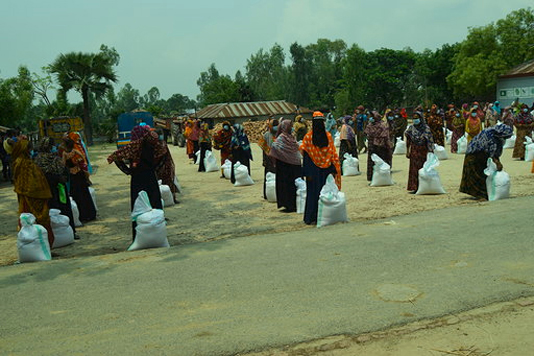RAJSHAHI, May 10, 2020 (BSS) – A total of 2,300 distressed families were given foodstuffs aimed at making them mentally strengthened to tackle their present livelihood related hardship being caused by the novel coronavirus (COVID-19) pandemic.
The beneficiary people were brought under a food package containing 20 kilograms of rice, five kilograms of potato, two kilograms of lentil, one liter of edible oil, one and half kilograms of sugar, one kilogram of suji, three soaps, four packets of ORS, two pieces of reusable face masks and essential medicines valued at Taka 50 each in Atrai and Raninagar Upazilas of Naogaon district.
The supports were given as emergency works to respond to COVID-19 on behalf of two development projects styled ‘Strengthening resilience and adaptability to climate change impact in North Bangladesh’ and ‘Inclusive quality education in formal and non-formal primary education in Bangladesh’ through maintaining social distancing.
DASCOH Foundation has been implementing the projects with financial support of German Government, Child Aid Network and NETZ Partnership for Development and Justice.
It has also distributed food aid among 700 pre-primary school students including 300 from the ethnic minority communities at three separate places in Nachole and Gomastapur Upazilas in Chapainawabgonj district with financial cooperation of the Education programme of Netz Germany recently.
Each of them were given 20 kilograms of rice, five kilograms of potato, two kilograms of salt and pulse each, one kilogram of sugar and suji each, two liters of edible oil, three soaps and face masks each and some necessary medicine for primary treatment.
With the DASCOH foundation mobilization, another 5,200 people of 1,000 ethnic minority households in Godagari and Tanore Upazilas in the district were given food support to mitigate the troubled situation.
Akramul Haque, Chief Executive Officer of DASCOH Foundation, told BSS that the food support was provided for protecting the vulnerable and marginalized populations from starvation as their contribution to the region’s farming improvement is significant.



